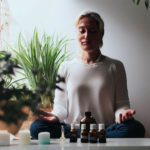Stress is an interpretation of an event or circumstance which is understood to be a threat. It can be any force or pressure put on a system (living or nonliving) which may result in a need for the system to adapt or change. Stress on human beings is like a rubber band. You also stretch to meet the environment around you, the demands of your lifestyle, and the pressures you put on yourself. If pulled too far, stress manifests itself in real conditions mentally, physically, and emotionally. Like a rubber band breaks when stretched too far, human beings have a breaking point too. The secret is to learn how to handle stress in your life and avoid becoming over-stressed.
The A B C’s of Stress
- Activating event
- Belief about the event
- Consequences of the event
Stress is the internal pressure we put on ourselves from external factors. Living with moderate stress keeps you sharp and ready to move forward, however extreme stress can put you out of commission. It depends on your stress levels—how much you can deal with effectively. Some people thrive with stressful situations and some people snap at the slightest uncomfortable circumstance. Depending on your current stress level, when confronted with a stressor, you may respond with shock or feel stuck.
The fast-paced, technologically advanced, complicated world has brought many changes to our lives. The pace of change does not seem to be decreasing, but rather increasing all the time. These changes put more demands and pressures on each of us to make adjustments to do more with less. While stress is a definite modern world reality, being “stressed-out” is not. We mistakenly believe that being stressed-out is “just the way it is.” And we often get in competition with each other about who feels the worst!
This is crazy thinking. Stress can be a powerful motivator in our lives, and in fact, you can learn to use stress to your advantage. If you think about it—one form of stress or another is responsible for everything big and small in our world. For example, the earth “stresses” a piece of coal until it turns into a beautiful diamond. The key is to find out how you can use the stress in your life to create a diamond out of a rock!
As with most things in life, prevention is the best medicine. By learning about your personal health risks, family history, current health, and life choices (eating, exercise, smoking, drinking, stress) you can make smarter decisions. Ultimately, your life choices affect how you feel and how you function.
Stress management comes down to self-management. It is about selecting appropriate options as well as making smart decisions.
The best way to avoid “burn out” is to become aware of your unique stressors and coping mechanisms. Burn out comes from experiencing stress over a prolonged period and often leads to a visit to the doctor. There are many ways to alleviate stress, however, you must find what works best for you and commit to doing it on a daily basis.
About The Author
Michelle L. Casto, M.Ed., is a Whole Life Coach, Speaker, and Author of the Get Smart! LearningBook Series, which includes books and workbooks on romantic relationships, career development, life purpose/life strategy, and stress management. Her coaching practice is Brightlight Coaching. She empowers people to live with passion, purpose, & possibility and inspires people to freely shine their brightlight to the world. To learn more or to subscribe to the Get Smart! Live Smart newsletter, Visit virtually: www.getsmartseries.com





